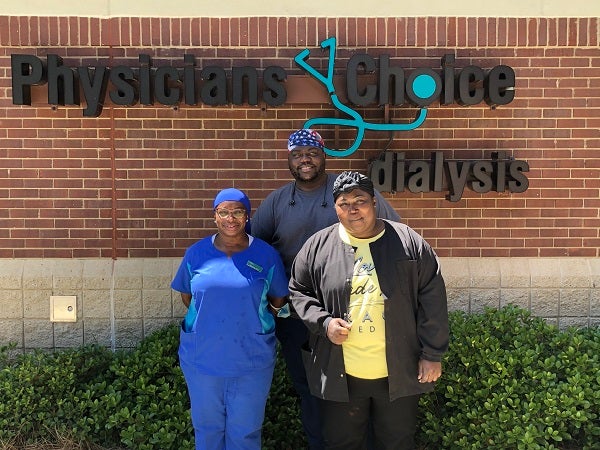Q&A with Luverne Physicians Choice Dialysis manager Michael Boothe
Published 2:11 pm Wednesday, April 29, 2020

- Physicians Choice staff includes, from left, Sonja Moss. Jennifer Streeter, (in back)Willie Harrell.
|
Getting your Trinity Audio player ready...
|
Luverne Physicians Choice Dialysis clinic manager Michael Boothe recently addressed a series of questions concerning how the local staff and patients have adjusted to COVID-19. Because dialysis patients are high-risk with regards to COVID-19, Physician’s Choice facilities have taken numerous steps, similar to other healthcare facilities, to reduce the risk of transmission of the virus within its facilities.
The Luverne Journal: Broadly speaking, what are the most radical changes made by your Physician’s Choice facility in response to COVID-19? How have things changed for patients and healthcare providers within your facility?
Boothe: As a dialysis facility, we are already required to wear full PPE (gowns, gloves and face shields) while in contact with our patients. As the news of the outbreak came to light, our company required mask to also be worn at all times by all staff (including physicians) and all patients.
The Luverne Journal: How does a dialysis center’s response to a pandemic differ from, for example, a hospital?
Boothe: Our response to monitoring patients with regards to symptoms is the same as any hospital setting. The main difference is that hospitals are capable of testing for COVID -19 onsite. As our patients are assessed, if they display any symptoms, we must contact our physician on call and have the patient sent immediately for testing. Then, the patient will return for treatment on a separate shift until the COVID testing has resulted. If the patient is negative, they can then return to their normal shift time, but if positive for the coronavirus, they must run on a separate isolated shift apart from non-symptomatic patients. They are separated from the general population for a total of 14 days and then sent for second COVID-19 test to ensure that they are now negative for the virus in order to return safely to their routine designated timeslot.
The Luverne Journal: Particularly, since every patient coming through the door could be considered “high-risk,” are there heightened methods of testing, monitoring or otherwise maintaining the health of patients? How is your facility advising high-risk patients in general right now?
Boothe: The patients are triage as they enter the facility. Patients are assessed pretreatment for fever, new cough, exposure to someone who tested +(positive) for COVID-19 and any recent travel outside of the USA. Patients are required to perform handwashing pre/post treatment, educated on the use of hand sanitizer and to keep six feet distance between others as permitted. Patients are reminded to notify staff of any s/s of active infection via phone before coming to the facility (i.e. fever, cough, chills, upper respiratory issues, etc.)
The Luverne Journal: How is the staff doing at this facility? It’s a demanding, to say the least, time for healthcare providers across the world.
Boothe: The staff are doing a wonderful job adapting to the changes required for COVID-19 assessments. The evening that the assessment changes were implemented by our company, the staff was assembled and we discussed everything that was occurring and what would be expected of us and our patients. We then put the plan into action, and the following morning, each patient was individually educated on the strict guidelines we were all facing to ensure 100 percent compliance by everyone involved.
The Luverne Journal: Are there examples of the staff coming together or of the community reaching out to support them?
Boothe: With regards to the community, our local EMA was very helpful with providing us with additional supplies (N95 masks) to ensure our safety. I would like to publicly thank Elliott H. Jones, director of the Crenshaw County EMA for his assistance with these supplies. We would also like to thank Mr. Petry and the team at First Citizens Bank of Luverne for their support and partnership during this challenging time.
The Luverne Journal: I know it’s probably different for specialized facilities, but is your clinic experiencing any kind of shortages are far as PPE or other equipment right now?
Boothe: Fortunately, we do not have any shortages of supplies. We are monitoring our supplies closely to ensure this does not occur.
The Luverne Journal: What kind of messaging is going out to the families of those on dialysis? With it being something that cannot be reasonably skipped or delayed, is there specific advice that is going out to caregivers?
Boothe: The families of our patients understand the risk our patients face. Families that accompany our patients to the facility, understand that we are currently not allowing any visitor within our building to reduce exposure to patients. All families involved have been very supportive.
The Luverne Journal: Please feel free to add any other thoughts or points not addressed in these questions.
Boothe: As a result of the COVID-19 virus, not only are our incenter patients affected, but those that are receiving Peritoneal dialysis have also been educated and updated on the coronavirus. Patients have been instructed to have those that are delivering supplies to wear mask before entering their home. And visitors must perform hand hygiene as well.
Due to the chronic health conditions of our patients, the virus has added additional stress to their lives. Along with educational material on social distancing and hand washing, patients are educated on coping mechanisms to deal with this new stressor. Our patients understand that they must continue to receive their dialysis treatments as prescribed. Each patient has been reassured that during this crisis, they will continue to receive the care that they need and deserve. Each patient understands that we will take all necessary precautions to prevent the spread of this virus within our facility.





